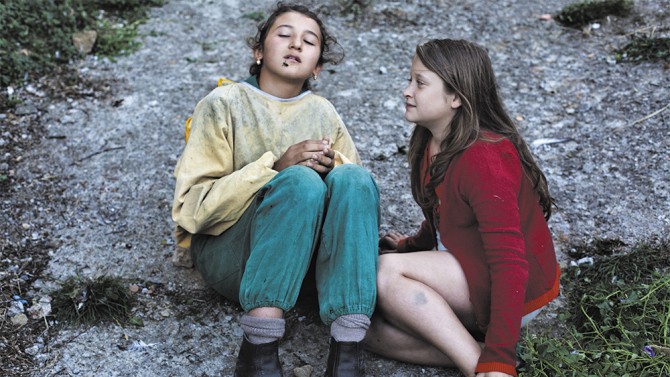Italian director Alice Rohrwacher took home the Cannes Grand Prix, the festival’s silver medal, this weekend. Her sophomore debut, Le Meraviglie (The Wonders), centers on a German-Italian family, like Rohrwacher’s own, though the filmmaker is the first to declare her work isn’t autobiographical. Le Meraviglie follows the coming-of-age of the oldest daughter in a rural family, headed by a domineering beekeeper father, amidst a profound transformation of the countryside where she grew up. It stars the director’s sister Alba Rohrwacher, Andre Hennicke, and Monica Bellucci.
Please give us your description of the film playing.
There are many concentric
circles in Le Meraviglie. The widest tells of the Italian landscape, its
destruction and its transformation into a sort of theme park. The best-known
book of the great urban sociologist Saskia Sassen is called Variation on a
Theme Park and reveals how cities are now turning into theme parks. The
same is happening to the countryside, and perhaps it is even more painful
because cities are, for the most part, artificial, while rural areas should be
human landscapes. The human landscape was one of the great Italian heritages,
an integral part of who we are. Our times have turned everything into
“scenery.”
Le Meraviglie takes place against a landscape, but in a
smaller circle it is the story of a family that belongs to that place even if
it is not traditional. It’s a family full of love, but a love [that is] a bit painful. In
the innermost circle of the film is Gelsomina, the eldest, who must open the
way for her younger sisters and figure out which way to go herself. She will
have to be able to feel tenderness for a father who seems like just a gruff obstacle.
She’s our guide and our eyes in the film.
What was the biggest challenge in making the film?
Writing is always the
hardest thing: creating the story, constructing it, giving it continuity and balance.
But also the work of casting (along with Clare Polizzi) and location scouting
(along with Emita Frigato) was long and difficult, because we were looking for
something that we were not sure how to describe, but we knew we’d recognize it.
The rehearsal process was challenging. I worked with Tatiana Lepore, who
prepared both children and dancer-turned-actor Sam Louwyck, an extraordinary actor
but [a performer] who came from a completely different world. Adding them to such a diverse
group, along with my sister Alba, Monica Bellucci, children, pets and
non-professional actors, made for a great adventure. At times it seemed too
difficult, but it was wonderful and brought an atmosphere of a traveling circus
to the film, with a close-knit and very united group.
What advice do you have for other female directors?
Frankly, it seems a bit too
early for me to give advice to others: I’ve only done two movies! I am happy
and overwhelmed to be in competition at Cannes, but I have to be careful not to
say and do stupid things myself, let alone give advice to others. However, to
everyone, male and female, I can only pass on what I have received from my
parents: work, work, work. Something will come out of it.
What’s the biggest misconception about you and your work?
Well in the case of Le Meraviglie, everyone has been scrambling to find out how autobiographical it is.
Was your father like Wolfgang? Does Gelsomina represent your sister Alba? What
about your mother? The film actually speaks of a world in which I grew up. It
is personal, but it is not so autobiographical. I did not want to do an
analysis, but rather a summary. In my opinion, making a film is the most beautiful
synthesis possible that exists in the arts.
Do you have any thoughts on what are the biggest challenges and/or opportunities for the future with the changing distribution mechanisms for films?
With our distributors BIM
for Italy and The Match Factory for international sales, we made a major effort
and we have created a website and a social media campaign in Italian and in
English. I almost want to say that to fully understand the film, please go to
the site. I say come in and visit because it is
actually built as the house where the family lives in Le Meraviglie. You enter
and visit the rooms, and in each room there is different content: the
characters, those who worked on the film, inspirations, even
scenes shot specifically for the web. Seems like a nice way to use these new
possibilities. [Editor’s note: Though it has been sold to various international markets, Le Meraviglie has yet to find a U.S. buyer.]
Name your favorite women directed film and why.
There are many women
directors that I love, and there are also many in Cannes these days that I
admire and follow with palpitation. But to talk about two great Italian
directors, I want to cite two strong women who made history: Lina Wertmuller
and documentary filmmaker Cecilia Mangini.
There are so few women in the main competition in Cannes. Talk about the importance of being one of the women directors visible at this highest level of the film business.
I was very happy when I
read that Thierry Fremaux said, “You do not program a festival to respond
to the controversy. I did not choose Rohrwacher and Kawase because they are
women, but because they have made some very important films.” This does
not mean that in other situations we should not instead impose quotas for women, to overthrow the privileges [means taking] forceful action.
Of course, we must also make an effort as women: a woman journalist who
interviewed me once kept asking, “Are you engaged? Are you in love?” It
seemed that interested her more than my film, and she told me, “But this is what
matters to women.” Maybe if all women first had a little more esteem about
ourselves, things would change faster.







